movies that make you feel like you're dreaming (but then you have to return to your daily existence anyway)
a visual feast for people detached from reality.
Lately, I've been devoting all my free time to discovering new gems of cinema, and I've found that Substack is the best space to share it. I’m amazed by artistic films, full of symbolism, meaningful, unconventional, provocative, experimental and mystical. Since people who are detached from reality, who luxuriate in the clouds, who enjoy the delusion of existence of a place where you can only dream, who choose avant-garde, grotesque, melancholy-filled characters (otherwise you wouldn't be here, let's get together) have gathered here, I decided that I dedicate this post to ethereal cinema in the context in which I understand the term.
What do I mean by this? Films consisting of dreamy, often deeply coexistent with the essence of nature frames, reminiscent of life in paradise (usually very illusory, because only apparently these places look like an idyllic garden of Eden).
The viewer can feel as if he or she is subtly balancing between a lucid dream and reality, as if running carefree through a meadow, as if time has stopped. There is an atmosphere of visions and illusions, things that happen there can be absurd, unusual and strange, defy logic. Besides, there is a sense that there is a lot we don't know about, that there is something rotten in this delicacy and beauty, which at some point will disturb this tranquility.
(Daisies, 1966) is a Czechoslovakian film directed by Vera Chytilová. I wondered whether to put it in this category, because it is very experimental, often chaotic and contradictory, but it is accompanied by a large dose of ethereality, sensuality, entering the world of daydreaming. A surreal everyday life of two rebellious teenage girls who, perceiving the world as broken, decide to ruin it even more. They start seducing men, destroying everything around them, having fun without looking at established social norms. The film criticizes consumerism and the system prevailing at the time. Here we have a brilliant example of being between dream and reality - the editing is pure absurdity, the colors change rapidly from faded to very intense, lacking logical transition and chronology, resembling a collage of torn-out scenes. The characters drift carelessly in this reality, as if it didn't concern them at all, they have a lot of childish innocence and joy, playing with food, spending time in gardens, laughing out loud, disregarding any consequences. They are “daisies,” something fragile that may soon disappear. Throughout the film, another main character is nature, they are surrounded by flowers, fruits, gardens, whose beauty and succulence is passing away. This unstructured world is crumbling and decaying, there are no values in it, higher ideas have died, and the girls no longer feel part of it, so they claim the right to do whatever they want.

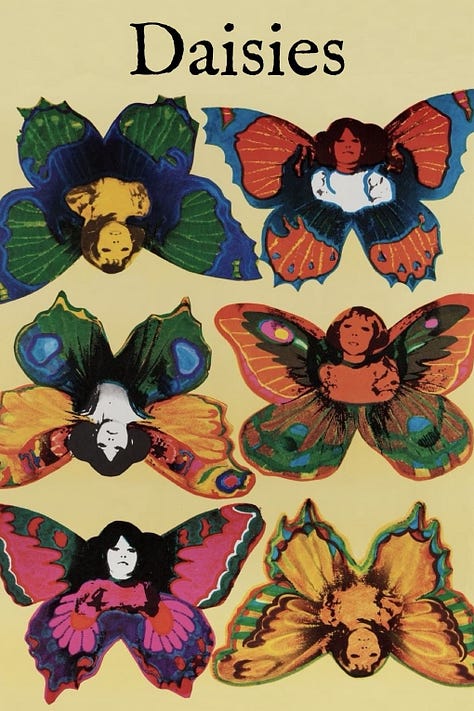

(Valerie nad her weeks of wonders, 1970) - Czech film directed by Jaromil Jireš, focusing on Valeria's growing up period, during which she receives magical earrings and experiences many absurd, oneiric incidents. A very important part of the cinema is the religious symbolism present - sacred objects, processions, crosses, the path the girl has to go through - from the imposition of obedience, staying pure and treating religion as a tool of oppression and the intimidation of original sin, to the rejection of precepts, created to control to discover one's own desires and knowledge of carnality. The film, like Daisies, is presented like a daydream full of fairy-tale characters.
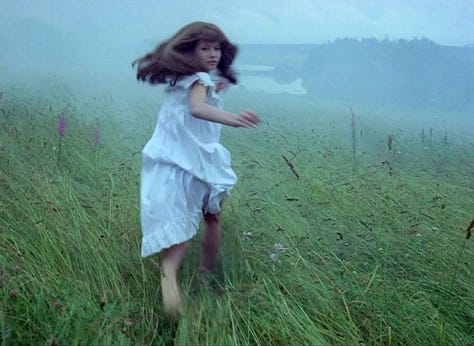


(Malá mořská víla, 1976) - Another Czechoslovakian film (I really recommend getting interested in this cinema!) directed by Karel Kachyňa, a retelling of the fairy tale of The Little Mermaid. The story ostensibly runs like the classic one - a mermaid emerges from the sea and falls in love with a human prince. She gives up her beautiful nymph voice in exchange for human legs to become a suitable partner for her chosen one. However, the story has a tragic ending, you must check what kind, because you might really be surprised. The film is extremely melancholy and fairy-tale-like although it has plenty of sadness and darkness in it. The little mermaid here is a character almost that transparent, fragile, delicate, easily hurt and plunged into loneliness. With all her heart she longs to fall in love and be loved. Ethereal are the chants of the sirens, the whispers present from everywhere, which, although beside you, further intensify this feeling of abandonment. The colors are very faded, as if from behind a fog, the sea foam and waves that come and go emphasize the impermanence of this world. Although the two worlds try to unite, it is not possible.

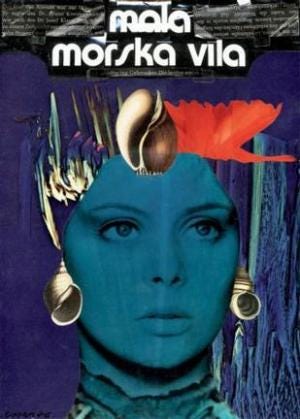

(Picnic at Hanging Rock, 1975) - This time an Australian film directed by Peter Weir. It's 1900, a group of female students of an elite school decide to spend Valentine's Day at a picnic right at Hanging Rock. Several of them suddenly disappear without a trace, and the atmosphere becomes increasingly tense. The film captivated me by the fact that it so amazingly combines the beauty and tragedy of the situation. On the one hand, we have the wildness of nature, an almost Arcadian place, although immensely mysterious. Suddenly this magical tranquility is destroyed by a disappearance under unexplained circumstances, making us, even as a viewer, start to lose our sense of security and feel that we have to be vigilant. The girls look like ghosts, ethereal in their airy white dresses, wandering in confusion through the Hanging Rocks. Time seems to flow lazily, slowly, mesmerizingly.


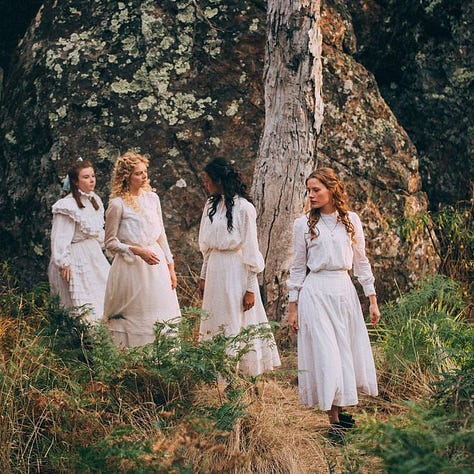
(Tuck Everlasting 2002) - A reflection-provoking American film directed by Jay Russell, focusing on a wealthy girl. Winnie Foster, who discovers the Tuck family, living in isolation from civilization, in harmony with the wilderness. Their secret, however, is that they will live forever. Immortality turns out to have two faces, to be both a gift and a curse. As viewers we are surrounded by a forest land, bathed in sunlight, coexisting with animals, until it is hard to believe that such a place could exist and we could live like this. In it, the characters walk around in early 20th century costumes, the colors are dim, evoking feelings of warmth but also nostalgia. Although the family has the opportunity to travel and explore the beauty of the world, they know that they have been fated to be here forever and that for that eternity, they will have to find a place for themselves. They don't have the chance to experience this cycle of birth and death,. which creates the meaning of life. The relationship between the lovers is incredibly innocent, subtle, melancholic, without outbursts of passion, but with small, beautiful gestures and silences. The film creates an image of a distant memory that we can only long for, but in the end it too will fade into our memory. We will forget the Tucks, and they will live on somewhere at the end of the world.
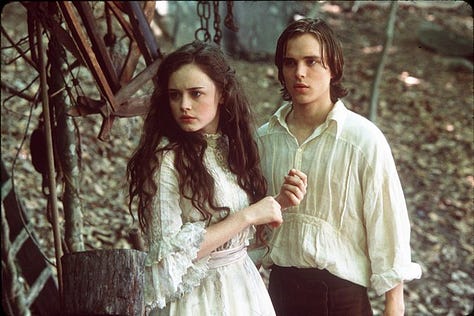
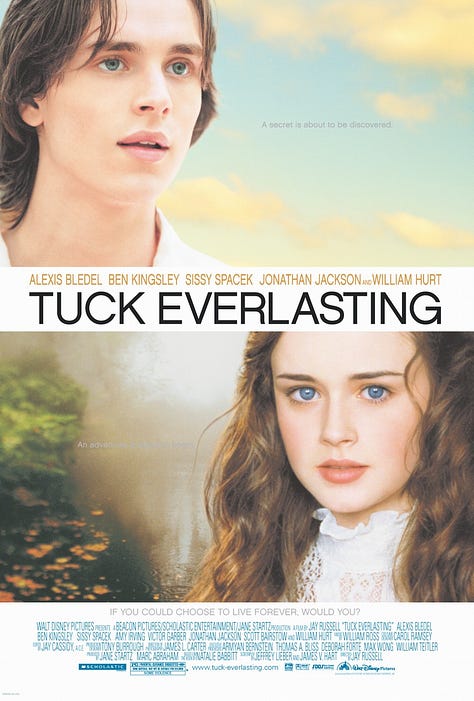
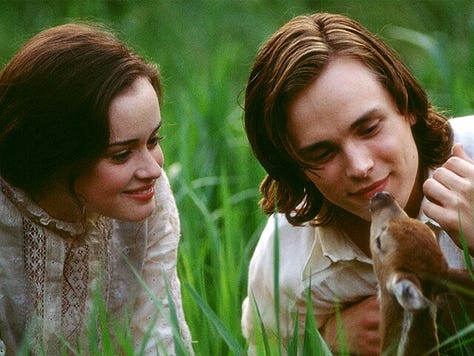
(Cracks, 2009) - British psychological drama directed by Jordan Scott. It has a lot of elements similar to “Picnic at Hanging Rock”, set in the 1930s and concerns an isolated English elite girls' school. The charismatic teacher Miss G heads the swimming club, whose female students treat her almost with worship. The arrival of a new student, however, turns the current calm into a game of obsession and jealousy. For a very long time I wondered if this film fit more into the ethereal or highly disturbing films (which I will also write about), but the very atmosphere of this false arcadianism made me have to include it here. The location of the boarding school itself is amazing, on the one hand, surrounded by green forests and a lake, it brings us back to the idea of being a fairytale land, and the girls are very lucky to have been able to be there. However, as the plot progressed, I had the impression that it is a closed area from which it is impossible to escape, we are doomed to be there. The girls wear white dresses, spend their days together, but this purity and harmony will soon be tainted by hidden desires and lust that will shatter this small world they have created. The film has a sentimental and mystical dimension, it is extraordinary to watch the protagonists as they plunge into the water, in the depths of which women's fantasies are also hidden.
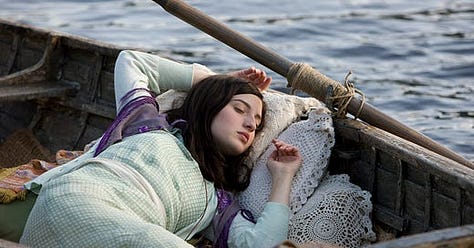
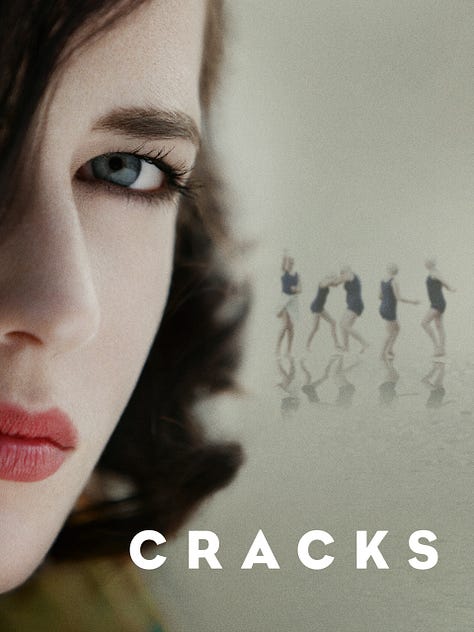
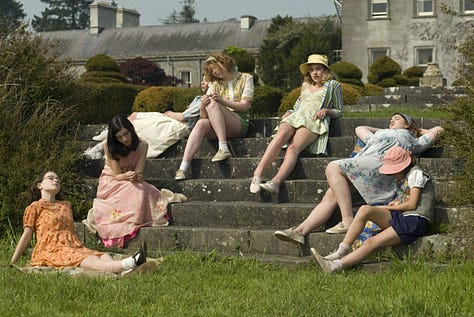
(Mirror 1975) - One of Andrei Tarkovsky's most personal films, like all of his cinema, extremely melancholic and nostalgic. A complex stream of interwoven flashbacks of memories of family histories, youth, adulthood and dreams, devoid of clear boundaries between past and present. He focuses tremendous attention on his relationship with his mother, as well as his wife and son, weaving in his father's poetry as well, making the film very meditative. The director pays attention to the details that created the scenes that were important to him, the wind moving the curtain, the tears on his cheeks, the dew on the leaves, the golden light coming through the window. They are depicted almost in a sacred way,. besides, their colors change, which shows how the protagonist shifts between different periods of his life. They give us the impression of being elusive daydreams, something that is at once close and so far away. We experience catharsis, being companions on the journey towards purification and reflection on life and death. The film is very symbolic, acting on feelings, emotions, emphasizing the transience of moments, which, although significant, after some time remain only in the mind as a hazy memory, to which a person wants desperately to return and feel them again as they were the first time.

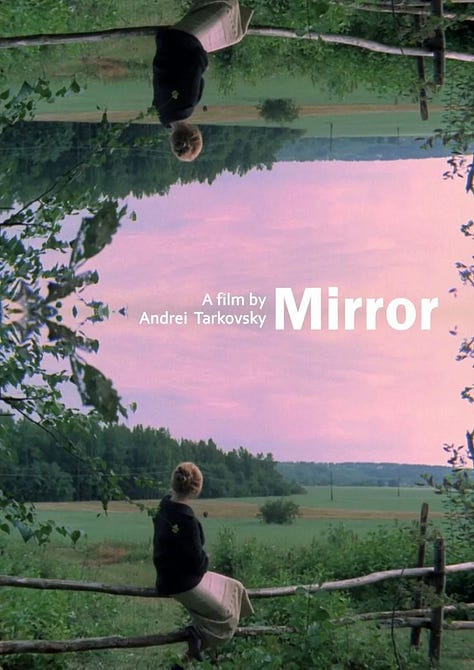

(Stoker, 2013) - American-British psychological thriller directed by Park Chan-wook. India Stoker, a teenager, unexpectedly loses her father, leaving her with a mentally unstable mother. A mysterious Uncle Charlie stands at their door, evoking extreme emotions, from fascination to suspicion and anxiety. As the plot progresses, we see how hidden fantasies step by step come to the surface, and the family hides more secrets than we could have predicted. India herself is a very ethereal character here, moving like a ghost with her pale skin, impassive expression and cold gaze, observing and isolating herself more and more. The teenager explores her surroundings - gothic landscapes, her inner self and her body. Despite the prevailing calm and softness, we feel that somewhere in the surrounding mist, something poisonous lurks. The film has a very dreamy atmosphere, there are many understatements, a piano plays melancholy in the background, and we are on the verge of wanting to stay there until the end and to escape from it as soon as possible. At the same time, we breathe deeply in the fresh forest air and suffocate in the homey, overwhelming atmosphere.
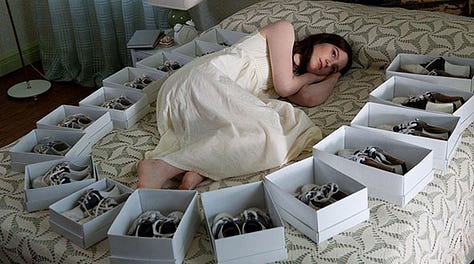

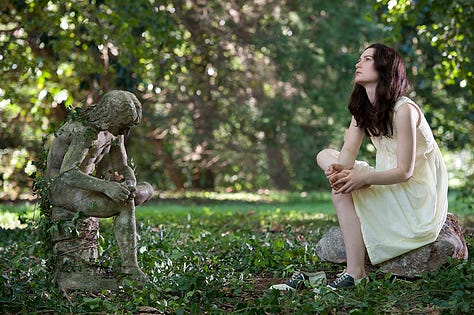
(Heavenly Creatures 1994) - New Zealand psychological drama directed by Peter Jackson, telling the story of an intense relationship between two teenage girls. The girls become increasingly immersed in the inner world they have created, at one point unable to distinguish between what has been created by their obsessed and mutually fascinated minds and what is real. The film is based on the true story of two girls, Pauline Parker and Juliet Hulme, who committed a crime in the 1950s. I don't want to tell you what type of crime, so if you don't want to know what dramatic thing will happen in the film, don't check these names before the seance. The protagonists lose touch with real reality at some point, their surreal imagination consumes them so much that, in addition to escaping to it during moments of longing, they begin to treat it as something realistic. It can be said that they intermingle between two, different universes. The relationship itself gains in intensity, they are fused together, like two halves of a poisoned apple, one does not exist without the other. Like soul mates, whom nothing can separate, but whose youthful affection led to tragedy. The images are poetic, the girls lie on the grass shoulder to shoulder and dream. Their minds suggest darker and more violent ideas to them, and they, wanting to have a sense of control, decide to carry them out.
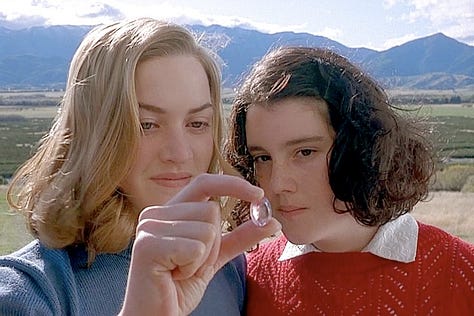

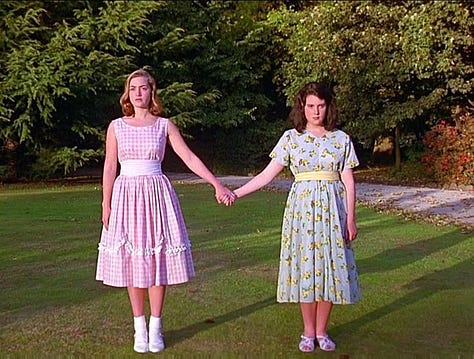
(The Secret Garden, 1993) - This story we probably all know from our childhood. Fantasy film directed by Agnieszka Holland, in which orphaned girl, Mary Lennox arrives at the English estate of her uncle, Archibald Craven. Incredibly lonely and abandoned, she tries to find herself in a new situation, no longer having support in her parents, and unexpectedly discovers a secret garden. Previously closed, it is brought back to life anew by Mary and her friends. With the arrival of the character, the previous emptiness in the old mansion is replaced by laughter and life, and the gray slowly becomes colorful again. A very touching film, about hope, the magic of every day, love and closeness. I don't know about you, but I, being an adult, still dream that one day I will come across such a place, at first wild and neglected, then changing into a space that is almost unearthly. Here the regained sparkle of the place reflects the lives of the characters, who also begin to see the world from a completely new perspective. The film lets us hear the birds sing, admire nature, feel the breath of wind on our skin and smell the flowers. Highly sensitive, subtle, mysterious atmosphere, evoking hope for a better tomorrow and the possibility of rebirth at any time.
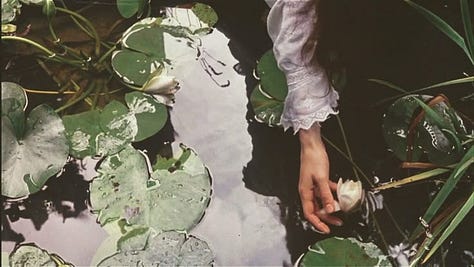
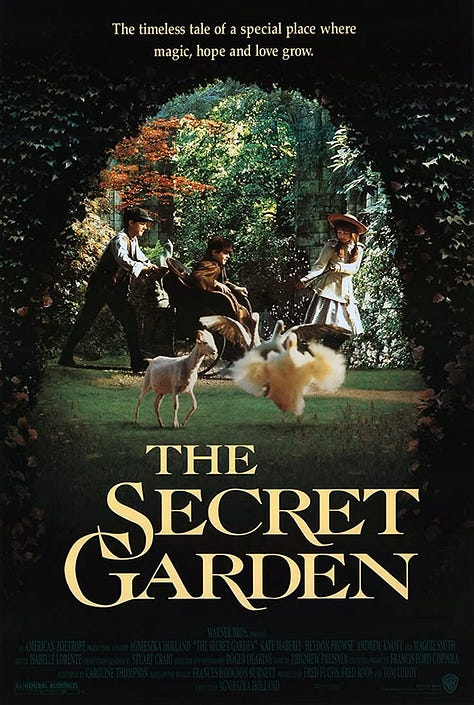

(Call me by your name, 2017) - Directed by Luca Guadagnino, is probably familiar to most, while I had to include it here because the atmosphere reminds me of “eternal vacations” (which, of course, end leaving behind a bitter aftertaste in the mouth of oranges that not long ago melted in the mouth with their juiciness). With each passing scene, the transience of moments that we wish would last forever is immensely sensed. The images are as if painted, the roasting in the sunshine of northern Italy, the bike rides to the hidden lake that Elio calls his favorite place to read, the details that focus attention on gestures that might go unnoticed without it, but say so much. We would like to last in this illusory idyll forever, but summer is coming to an end, and with it comes autumn painfully bringing us down to earth. The soundtrack is one of the best I have heard in any film. After the screening we are left alone in silence and obscurity, brutally awakened from the paradisiacal dream.

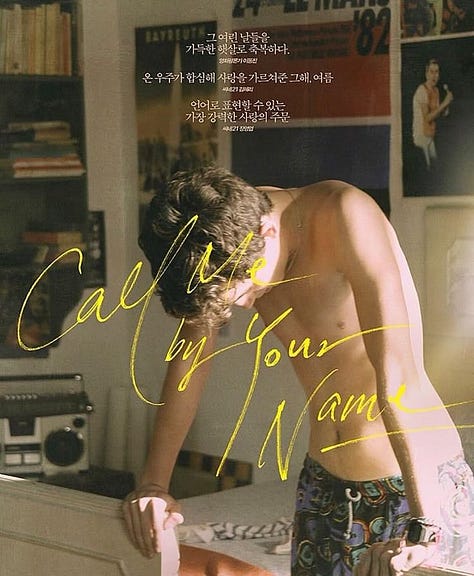
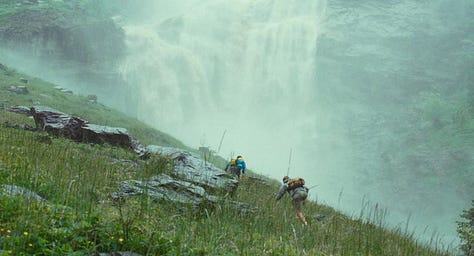
(Atonement, 2007) - This is a British war drama directed by Joe Wright. England, summer of 1935, thirteen-year-old Briony Tallis wrongly accuses her servant's son Robbie Turner of a crime. This separates the boy and her older sister Cecilia, who is in love with him, and the situation tragically ends during World War II. Briony years later seeks to redeem his guilt and clear his tarnished name by writing a story about the harm done. Visually, it is a sensual feast for the eyes, sunsets, gardens, baths, rain, meadows reflected in sheets of water, very detailed, nostalgic frames. More than once, due to the passion of the main character, we hear the sounds of a typewriter as a soundtrack, which I find absolutely soothing. Briony's story evokes melancholy and longing, woven from memories, making all returns to what was seen as if through a fog - we balance between lies and truth, present and past. We experience the process of atonement of Briony, who would like to go back to that moment and make the world not only for her, but also for her loved ones something better. To wake up from a bad dream, which in reality, unfortunately, is her real life.
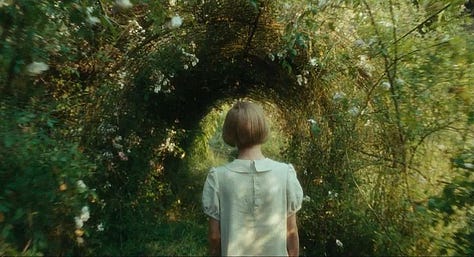


(Donkey Skin, 1970) - French fantasy musical directed by Jacques Demy. It is based on a fairy tale about a princess who flees her kingdom, hidden in a magical donkey skin, because she is about to be forced to marry her own father. A fairy godmother helps her start a new life deep in a forest cabin with blooming gardens. Despite her disguise hiding her beauty, a prince falls in love with her.This is an absurd fable built on contrast - the king's castle bathed in the red of forbidden desires, while the good fairy's palace shines blue and silver. Besides, the paintings are kept in pink, lavender, blue and gold, making them seem soft, filled with magic, dreamy - the princess's richly decorated gowns are inspired by the sun and moon, while her disguise is austere and easy to blend into the background. The musical has a theatrical and grotesque dimension, referring to ancient legends and folklore, and has dark undertones.
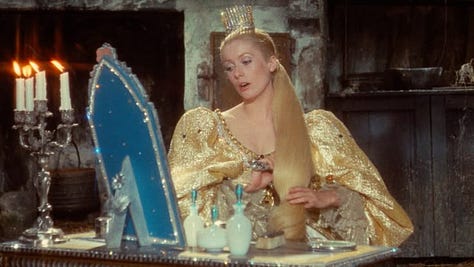
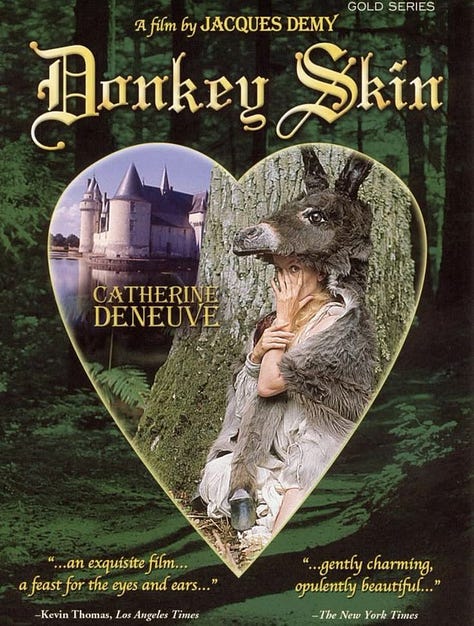

(A Ghost Story, 2017) - American drama directed by David Lowery. I considered for a very long time whether to give it here, but the melancholy convinced me. The ghost of a dead man returns to his home to observe his wife's mourning, but also unable to move between the past and the present himself. The cinema is focused on passing, reflection, searching for the meaning of one's existence and experiencing loneliness. The colors are extremely melancholic, deepening the sadness - pale blues, broken whites, grays, a man in a white sheet with his eyes cut out glides through the dawn quietly, unnoticed, isolated and suspended between two worlds. The scenes are long and the silence is very eloquent, giving us time to look at ourselves, feel the longing and devote more reflection.
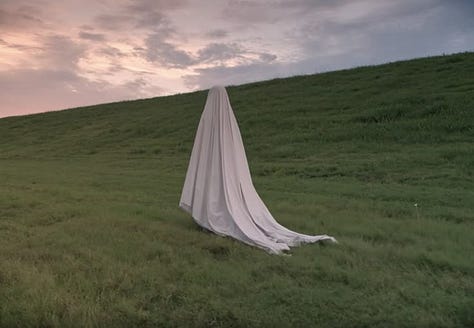
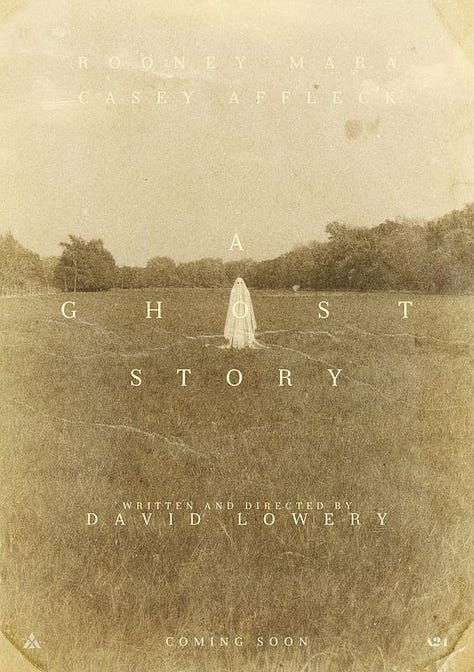
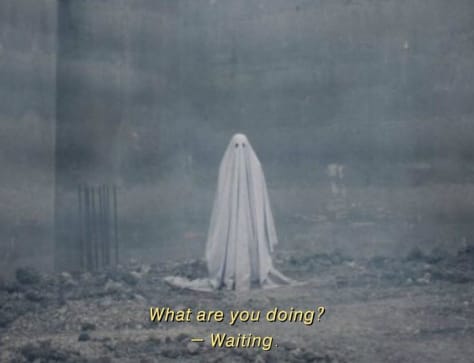
Last but not least, a ballet version of “A Midsummer Night's Dream” 1967, based on Willam Shakespeare's comedy, depicting an enchanted forest with the intermingling worlds of humans and fairies one magical night. I know it's not cinematic, but it has such a unique, special atmosphere that I had to share it - the hovering forest mist, mischievous little flickering lights like fireflies, whimsical faeries, and passionate lovers give us the impression that we have invaded a dreamy land, inaccessible to everyone, as if we were hidden in the thickets of bushes watching the doings of the pixies. The lighting makes us feel as if moonlight is falling on the stage, harmonizing with the shades of pink, blue, purple, green and silver and the silky, airy, shimmering costumes. The music is something that could only be created by forest creatures, very angelic, sleepy and soothing, rich with bells and harps. The artists in their movements look as if they are floating above the earth, swimming and are not from the same world as us, especially when we witness the fairy circle dance, like an unfolding ritual, in which we do not want to disturb them for anything in the world.
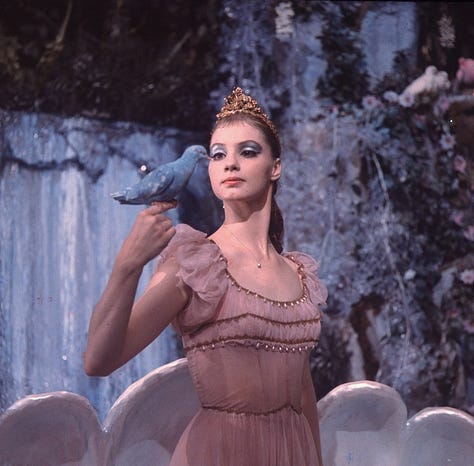
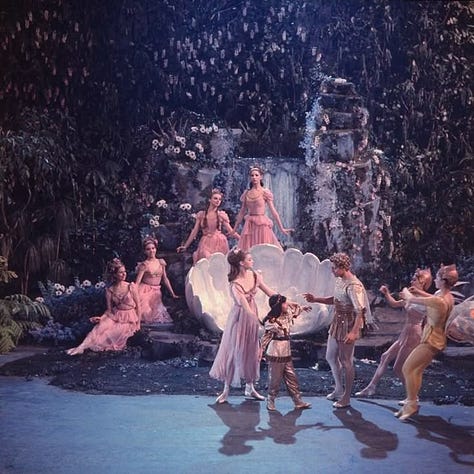
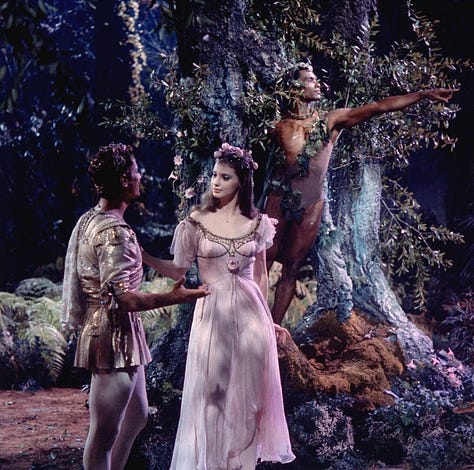
Use this post to share similar movies that made you cry, emotional, nostalgic, melancholy, loved the world or wanted the world to fall apart, yearned to fall asleep and wake up in this land, started to adore unusual characters even more, escaped to another reality to occupy your thoughts and stay in another world, then melodramatically sighed that you had to return from it to your everyday existence.
Thank you for reading and subscribing. Find me on tiktok, instagram, pinterest and tumblr.






A lovely list 🥰
I definitely recommend Labyrinth, Fantaghiro, A Little Princess, and The Little Mermaid (1976) !
two films that came to mind are "poor things" and "paradise hills"